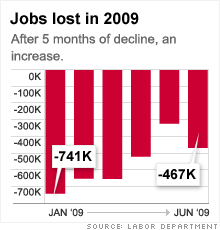Laid off workers get their jobs back
After getting laid off, a number of workers are going back to work - for their old employer.

NEW YORK (CNNMoney.com) -- More than 550 laid-off production line workers in Pennsylvania finally got some good news. Oshkosh, the truck maker who gave them their pink slips, is now hiring them back.
Oshkosh isn't the only company calling back it's previously laid-off workers. Nearly a fifth of displaced employees return to the company that issued their pink slip, a survey said Tuesday.
Eighteen percent of laid-off workers who landed new positions were rehired by the same employer that let them go, up from 13% in 2005, according to Right Management's outplacement services, a division of Manpower.
More than 17,000 outplacement candidates were surveyed by Right Management between June 2008 and June 2009.
"In some instances, organizations are realizing that they may have cut too deep and are bringing people back in consulting roles or for project work," Melvin Scales, senior vice president for global solutions at Right Management, said in a statement.
"Former employees have the organizational knowledge and skills to jump back into roles quickly to get the job done," Scales said.
But redundant firing and hiring can be disruptive to workforce performance and costly for the company, particularly in the form of severance payments, he noted.
Scales recommends that employers consider redeploying workers as an alternative to layoffs. "It's a way of leveraging the skills and talents of existing employees and reassigning them to new roles within the organization. It provides an opportunity to retain valued talent, reduce the cost of turnover and leverage knowledge transfers within the company," he said.
Previous research conducted by Right Management found that only one in two employers offer redeployment before layoffs.
The battered U.S. labor market has witnessed severe job cuts across the board over the course of 2008 and 2009.
Nearly 3.4 million jobs have been lost already in the first half of 2009, more than the 3.1 million lost in all of 2008. ![]()

